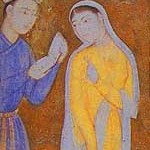Polygamy and Marraige
Nov 09
Question – What is the origin of polygamy in Islam? Was it a “revelation” or economic necessity or a result of Muhammad’s lifestyle? Is it common about Arab tribes?
 The sacred texts of Islam, Christianity and Judaism do not explicitly prohibit polygamy or polygyny (a man married to more than one woman at a time).
The sacred texts of Islam, Christianity and Judaism do not explicitly prohibit polygamy or polygyny (a man married to more than one woman at a time).
Biblical prophets, like Muhammad, practiced polygyny. In the Biblical scriptures, Abraham had three wives (Genesis 16:1, 16:3, 25:1). Moses had two wives (Exodus 2:21, 18:1-6; Numbers 12:1). Jacob had four wives (Genesis 29:23, 29:28, 30:4, 30:9). David had at least 18 wives (1 Samuel 18:27, 25:39-44; 2 Samuel 3:3, 3:4-5, 5:13, 12:7-8, 12:24, 16:21-23) and Solomon had 700 wives (1 Kings 11:3).
Polygamy was allowed in both Jewish and Christian practices. Judaism expressly prohibited polygamy in the beginning of the eleventh century. Its prevalence in Christian practices is mixed. Mormons allow it to this date while other sects allowed it till as late as the sixteenth or seventeenth century.
Islamic sacred texts allow polygamy but do not require it.
The Quranic verses related to polygamy were revealed after the battle of Uhud, which left behind many widows and orphans who needed protection. In tribal societies marriage was one of the foundational institutions that ensured protection of women and children.
“If you fear that you shall not be able to deal justly with the orphans, marry women of your choice, two, or three, or four; but if you fear that you shall not be able to deal justly (with them), then (marry) only one.” (Quran 4:3).
Polygamy is allowed but discouraged.
“And it will not be within your power to treat your wives with equal fairness, however much you may desire it; and so, do not allow yourselves to incline towards one to the exclusion of the other, leaving her in a state, as it were, of having and not having a husband. But if you put things to rights and are conscious of Him – behold, God is indeed much-forgiving, a dispenser of grace.” (Quran 4:129)
These verses show that a man marrying multiple women is not a fulfillment of his sensual desires. Islamic law allows a woman to seek divorce if her husband fails to support her adequately. The sacred texts of Islam when compared to the sacred texts of other religions actually limit the practice of polygamy by placing stringent conditions, which are very difficult if not impossible to fulfill. Polygamy is viewed as lesser evil than the harm caused to children orphaned and women left without protection as a result of war. Thus if a society evolves to provide adequate protection to women and children then the institution of polygamy becomes irrelevant.
In modern day Muslim majority societies the practice of polygamy is rare (1-3% by some accounts). In many Muslim majority countries (Azerbaijan, Bosnia and Herzegovina, Tunisia and Turkey) polygamy is not legal. Muslims living as minorities in the West are not clamoring to be granted exceptions to practice polygamy. Much like the Mormons in the U.S., American Muslims do not practice polygamy.
 A note about marriage in Islam: Marriage is solemn contract between a man and woman.
A note about marriage in Islam: Marriage is solemn contract between a man and woman.
The Quran says, “Your wives are a garment for you, and you are a garment for them.” (Quran 2:187). “Garments” offer both protection and beautification.
“It is He who created you from a single soul, And made its mate of like nature in order that you might dwell with her in love….”(Quran 7:189).
One of the great Muslim poets Rumi wrote:
May your vows and this marriage be blessed.
May it be sweet milk,
this marriage, sweet drink and halvah.
May this marriage offer fruit and shade
like the date palm.
May this marriage be full of laughter,
your every day a day in paradise.
May this marriage be a sign of compassion,
a seal of happiness here and hereafter.
May this marriage have a fair face and a good name, an omen as welcome as the moon in a clear evening sky….
May spirit enter and mingle in this marriage.
